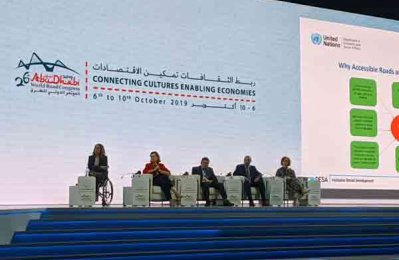Leading road and construction industry professionals explored the possibility of adapting roads for people of disability for the first time in the 111-year history of the World Road Congress.
At the ongoing event in Abu Dhabi, the World Road Association (PIARC) members and global experts addressed the important topic on how countries can help change the everyday lives for disabled people when it comes to travelling.
During the Foresight Session – ‘Disabled-inclusive road transport’, Charlotte McClain-Nhlapo, Global Disability Advisor of the World Bank Group who chaired the discussion said: “We are really excited today to be able to have this discussion as it is an important topic that typically hasn’t been discussed in forums such as these.”
Speaking about the UN’s Sustainable Development Goals, she said: "The sustainable development goals laid out by the UN are important because they set key targets that address the need for safe, affordable, accessible and sustainable transport systems for all by 2030."
“It’s important to recognise that this target makes explicit reference to persons of disability and the need to have accessible means of transport for persons of disability,” she stated.
Daniela Bas, the director of the Division for Inclusive Social Development (DISD) at the United Nations Department of Economic and Social Affairs (DESA) who led the panel discussions while explaining the importance of accessible transportation said: "In this day and age, transportation is the lifeline to access education, employment, healthcare and even social and community life."
"Accessible and inclusive transportation will enable people to live independently and break the cycle of poverty, dependency and exclusion," stated Bas.
While urging transport infrastructure planners and engineers to change their mindset to help achieve inclusivity, she added: "With all countries and stakeholders who have committed to provide access to affordable and safe transport under UN’s Sustainable Development Goals, I am sure we can welcome a new culture of inclusivity and accessibility."
"Building accessible roads is a matter of justice and common sense as well as investing in the future. Inclusion is not only a legal obligation, it is also an economic and social imperative that we need work together for," she added.
Mary Crass, Head of Institutional Relations and Summit for the International Transport Forum, Pan Haixiao, Professor of Urban Planning in the Department of Planning at Tongji University in Shanghai, Saeed Mohamed, Global Senior Transport Specialist at Islamic Development Bank and Claire Smith, Head of Transport Accessibility Policy of Transport Scotland also took part in the panel discussions and explained how crucial it is to have a roads network that is easily accessible for the disabled.-TradeArabia News Service
Global experts discuss roads for People of Disability


&uuid=(email))